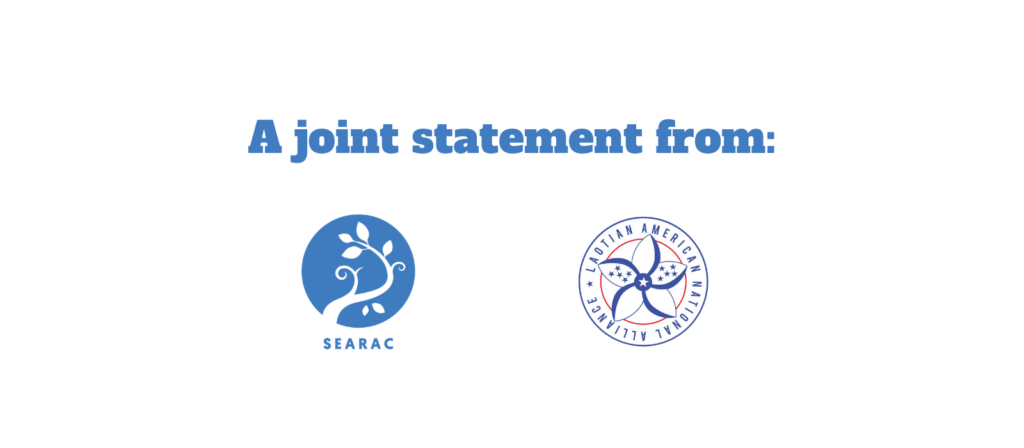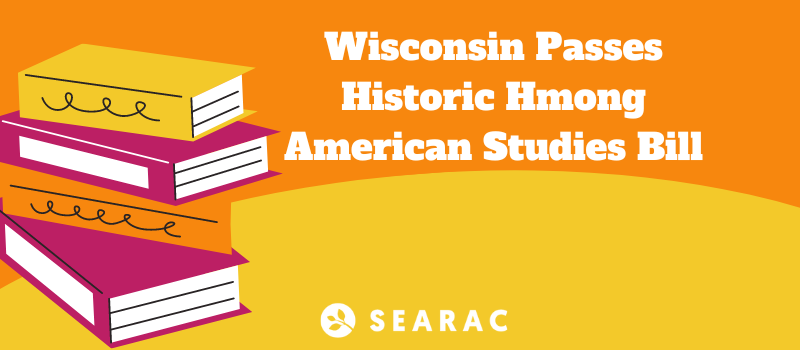February 7, 2022 IN: Immigration, National, Press Room
US Lifts Visa Sanctions on Laos

UPDATE/CORRECTION: An earlier version of this statement inaccurately indicated that the United States had also lifted 243(d) visa sanctions on Cambodia. SEARAC staff were very excited at the news about Laos and misread the update to visas processed in Cambodia. The 243(d) visa sanctions there remain in place. SEARAC is committed to lifting all visa sanctions and reforming that entire section of law so that this tool cannot ever be used again to threaten our families. We apologize for this oversight.
For Immediate Release:
February 7, 2022
February 7, 2022
Washington, DC – In a major victory for Southeast Asian American communities, the Biden Administration has lifted its visa sanctions on Laos, ending a years-long immigration ban instituted during former President Trump’s term in office. The Trump Administration had previously suspended visas from these countries as a shameful tactic to pressure them into increasing deportations from the United States.
The announcement comes as 1.4 million Asian community members wait to reunite with their families in the United States, including over 210,000 individuals from Vietnam, 9,000 from Cambodia, and 2,000 from Laos.1,2 Some of these individuals have been in the visa backlogs for over a decade.
Now, community members like Moua Vang and his wife Dokmai can be reunited in the United States to build the lives and families together that they deserve. After their marriage in Laos in 2018, the United States Embassy refused to process Dokmai’s visa because of the sanctions, and she was not allowed to enter the United States. The stress of this experience has been overwhelming for Moua, who has spent close to $80,000 trying to bring his wife to the United States.
Mai Neng Moua, lawyer for Moua and Dokmai, shared that the couple was “ecstatic” upon hearing the news that the visa sanctions had been lifted. “It has been a very long and difficult journey, and they can’t wait to be reunited to start their life together in the United States.”
During the Trump Administration, deportations of Southeast Asian Americans were at the highest they had ever been, even as community members were eligible for relief through a groundswell of family, community, public and congressional support. In 2018, the Trump Administration broadened visa sanctions on Laos for not complying with their demands to speed up deportations from the United States, establishing an immigration ban for Hmong, Iu Mien, and Laotians. These retaliatory actions followed a 2017 visa sanction on Cambodia, which increased removals of Cambodians by 279% and Vietnamese removals by 58% between 2017 and 2018.
In September 2021, Rep. Ilhan Omar (D-MN-5) circulated a letter in the House of Representatives urging for the lifting of visa sanctions on Burma, Burundi, Cambodia, Eritrea, and Laos. The letter was signed by Reps. Bass, Sara Jacobs, Ocasio-Cortez, Clarke, Pressley, Jayapal, Lowenthal, Chu, Pocan, and Correa, and it was endorsed by more than 30 advocacy organizations, including LANA and SEARAC.
Vimala Phongsavanh, Board Chair, Laotian American National Alliance (LANA): ”We applaud the Biden Administration for lifting the Trump Administration’s visa sanctions on Laos. As a community of refugees and immigrants, Laotian families have witnessed firsthand the generational trauma of family separation. We are relieved that our communities can be reunited with their families; but we recognize that this is just one important step to putting a stop to Southeast Asian deportations and punishing countries that refuse to accept deported people.”
Kham S. Moua, Director of National Policy, Southeast Asia Resource Action Center (SEARAC): “The lifting of the visa sanctions against Laos comes as a huge relief to our Iu Mien, Hmong, Lao, and other Laotian communities, after a long battle by community advocates, elected officials, and impacted individuals to ensure that the injustices of the previous administration were corrected. The end of this ethnic immigration ban against individuals from Laos had kept war-torn families apart and perpetuated violence against refugees and immigrants. SEARAC applauds the tireless work of President Biden and Rep. Omar to ensure that Southeast Asian Americans can reunite and heal, and we look forward to our continued work together to ensure that no families face cruel separation.”
Quyên Đinh, Executive Director, Southeast Asia Resource Action Center (SEARAC): “SEARAC is thrilled that the sanctions against Laos have been lifted, and we commend President Biden and Rep. Omar for their diligence and dedication to Southeast Asian American families. This is an important step to ensuring that Laotian Americans can remain united in the nation that they call home with less pressure on their countries of origin to accept their removals. However, our fight is not over. Deportations of Southeast Asian Americans continue today, tearing families apart. Furthermore, these visa sanctions still exist for Cambodia, Burma, Eritrea, and others, further pressuring deportations. We urge the Biden Administration and the Department of Homeland Security to lift these sanctions so that other families can similarly remain whole.”
FOOTNOTES
1. Annual Report of Immigrant Visa Applicants in the Family-sponsored and Employment-based preferences Registered at the National Visa Center as of November 1, 2019.
2. Asian Americans Advancing Justice, AAJC.
###
SEARAC is a national civil rights organization that empowers Cambodian, Laotian, and Vietnamese American communities to create a socially just and equitable society. As representatives of the largest refugee community ever resettled in the United States, SEARAC stands together with other refugee communities, communities of color, and social justice movements in pursuit of social equity. www.searac.org
For more than 20 years, the Laotian American National Alliance (LANA) has been dedicated to advancing the social and economic well-being of Laotian Americans in the United States through civic engagement and public policy advocacy. Learn more about LANA’s work at www.lanausa.org





